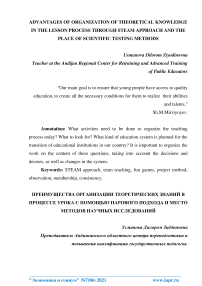Advantages of organization of theoretical knowledge in the lesson process through steam approach and the place of scientific testing methods
Автор: Usmanova D.Z.
Журнал: Экономика и социум @ekonomika-socium
Рубрика: Основной раздел
Статья в выпуске: 7 (86), 2021 года.
Бесплатный доступ
What activities need to be done to organize the teaching process today? What to look for? What kind of education system is planned for the transition of educational institutions in our country? It is important to organize the work on the content of these questions, taking into account the decisions and decrees, as well as changes in the system.
Steam approach, team teaching, fun games, project method, observation, membership, consistency
Короткий адрес: https://sciup.org/140259772
IDR: 140259772
Текст научной статьи Advantages of organization of theoretical knowledge in the lesson process through steam approach and the place of scientific testing methods
According to the Resolution of the President of the Republic of Uzbekistan "On measures to establish presidential schools" dated February 20, 2019 No PP-4199, Presidential schools will be opened in each region of the country to identify talented young people.
They specialize in STEAM.
STEAM is a new method of teaching schoolchildren and is an alternative to the traditional system of teaching.
It is based on a system of teaching children simultaneously in Science, Technology, Engineering, Art and Mathematics, in which students practice and cooperate. They take lessons with the help of project projects.
The formation and development of didactic education in Uzbekistan is associated with the names of teachers and scientists such as Abdulla Avloni, Hamza Hakimzoda Niyazi, Muhammadrasul Rasuli, Qori Niyazi, Sadriddin Aini.
One of our encyclopedic scholars, Abu Rayhan Beruni (973-1048), was one of the scholars who studied the educational process in depth. He speaks about the ways and means of acquiring scientific knowledge. In the process of learning, the teacher follows the following laws:
-
- not to bore the child;
-
- based on diversity in education;
-
- membership, consistency must be observed. Beruni also notes that interesting, mostly visual, presentation of new topics can be effective.
Abu Ali Ibn Sina (980 - 1037), emphasizing the need for individuals to be educated in an educational institution, emphasizes the following aspects of education:
-
- Do not suddenly engage in books while educating the child;
-
- impart knowledge by going from easy to complex in education;
-
- teaching as a team and focusing on teaching in an educational institution;
-
- to take into account the inclinations, interests and abilities of children in education;
-
- combine training with exercise.
These rules have become an integral part of education.
Later, the Czech scholar Jan Amos Comenius also conducted research on the subject and began writing his Great Didactics. In this work, YA Comenius demonstrates the effective principles, methods, systems of teaching processes on the basis of accurate data. He was awarded the title of "Father, Founder of Didactics".
The development of students' speaking skills is inextricably linked with the development of correct, clear, concise oral speech. The book grows a person's mind, develops his attention. It cultivates perseverance and will to achieve the desired goal, its algorithmic style provides discipline and, most importantly, expands its thinking.
The science of pedagogy studies the pedagogical phenomena and processes that exist in the enrichment of its content in ways that are relevant to its goals and objectives. The more correctly the scientific research methods of pedagogy are used, the more the content of education will be updated and improved. But a clearly limited system of scientific research methods has not yet been created in science. In the pedagogical process, the educator derives from the characteristics of the students of his audience, a number of methods can be applied by studying their psychology in depth. Because the main goal of the educator is to increase the educational impact of the teaching process. To do this, it is necessary to cite the following methods of pedagogical research.
-
1. Method of pedagogical observation. 2. Conversation method (individually, with a group). 3. A way to explore student creativity. 4. Test method. 5. Method of data analysis. 6. Experimental method. 7. Method of statistical data analysis. 8. Mathematics and cybernetics method.
In fact, the educational process, as mentioned above, can be achieved through similar observations, the organization of classes in the form of entertaining games, training in project coverage, teamwork and collaboration. teaching to acquire the necessary knowledge is one of the main tasks of STEAM education.
This is a logical consequence of combining theory and practice. STEAM Made in America. Some schools took into account the careers of the graduates and decided to combine subjects such as science, technology, engineering and mathematics, and the STEM system was formed in this way. (Science, Engineering and Mathematics). Later Art was added here and now STEAM is formed to the end. Teachers believe that knowledge of these topics, more specifically from these subjects, will help students to become highly qualified professionals in the future. As a result, children strive to acquire good knowledge and immediately put it into practice.
In short, STEAM education is young
Список литературы Advantages of organization of theoretical knowledge in the lesson process through steam approach and the place of scientific testing methods
- Resolution of the President of the Republic of Uzbekistan "On measures to establish presidential schools" dated February 20, 2019 No PP-4199.
- H. M. Baybaeva Text of the lecture "STEAM education: content, significance". 2020. T.


